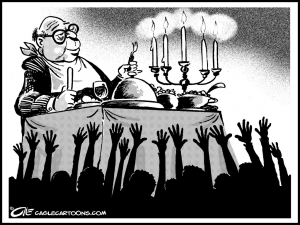By Michael Hoexter
 Rational public debate about the economy and government’s role in the economy is currently in extremely short supply. In a debt-deflation, a weak economy saved from Great Depression-level misery by half-way, inadequate government action, government spending is now blamed categorically for the ills of the economy by the aggressive austerity campaign that has captured the political discussion in major capitals. Previous flaws in the economic theory of the state and theory of money, typically consigned to the realm of different economic “tastes” or moral persuasions, are now revealed to be catastrophic gaps in most economists’ and the public’s understanding of the basics of the capitalist economy. The predatory austerity campaigners, many originating from within the financial industry, have turned what should have been an era of greater clarity about government’s critical role in the economy into a scapegoating of government for ills perpetrated for the most part by components of the financial sector or by the subservience of the public sector to the financial sector. Austerity policies when implemented are the equivalent of ‘economicide’ as they strangle government’s ability to spur lagging demand for real goods and services as well as government’s role in steering the economy to deal with challenges that the private sector can’t or doesn’t want to face on its own.
Rational public debate about the economy and government’s role in the economy is currently in extremely short supply. In a debt-deflation, a weak economy saved from Great Depression-level misery by half-way, inadequate government action, government spending is now blamed categorically for the ills of the economy by the aggressive austerity campaign that has captured the political discussion in major capitals. Previous flaws in the economic theory of the state and theory of money, typically consigned to the realm of different economic “tastes” or moral persuasions, are now revealed to be catastrophic gaps in most economists’ and the public’s understanding of the basics of the capitalist economy. The predatory austerity campaigners, many originating from within the financial industry, have turned what should have been an era of greater clarity about government’s critical role in the economy into a scapegoating of government for ills perpetrated for the most part by components of the financial sector or by the subservience of the public sector to the financial sector. Austerity policies when implemented are the equivalent of ‘economicide’ as they strangle government’s ability to spur lagging demand for real goods and services as well as government’s role in steering the economy to deal with challenges that the private sector can’t or doesn’t want to face on its own.











